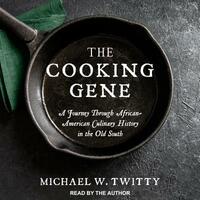You need to sign in or sign up before continuing.
Take a photo of a barcode or cover
538 reviews for:
The Cooking Gene: A Journey Through African-American Culinary History in the Old South
Michael W. Twitty
538 reviews for:
The Cooking Gene: A Journey Through African-American Culinary History in the Old South
Michael W. Twitty
Equal parts culinary history, memoir, and genealogy, this was a phenomenal journey through the history of southern cuisine. Michael Twitty brings us, the reader, along for a deeply personal journey as he outlines how Southern cuisine had its genesis in the African American slave experience.
This book is really well researched and very well written. I think if someone is really into genealogy this could be a really good read for them. I had a hard time attending to it, though.
Deep history interspersed with personal narrative and culinary knowledge. Michael takes us through space and time, walking us through plantations (literally, as he works on them as an interpreter, and figuratively, as he scours historical documents), ports, homes, restaurants, fields, and memories. The audiobook is especially riveting with Michael as narrator.
An exploration of the history of African American cuisine via one man's investigations into his enslaved ancestors. Memoirs are usually compulsively readable, even if grim; despite appearances this is too broad in scope to be a memoir, and it's certainly not quick reading. Twitty makes some attempts to justify the book's messy structure, and he's right that the subject, particularly the genealogical focus, is by nature disjointed and complex; this still wants for a refined introduction, a stronger roadmap, and better flow within its component parts. At the same time, it effectively combines individual narratives with larger historical setting with the author's personal framework; it's the clearest glimpse I've had into the true scope of slavery in the United States. It makes for a devastating, unremitting reading experience, but Twitty is driven by obvious passion. A complicated book! I'm not convinced it's very well written, but it achieves its lofty central ambition, tying culture to cuisine to African American history, primarily as it informs one individual's worldview. (So it is, in some ways, actually a memoir.) It's exhausting; I'm glad I read it.
A fascinating look at both the author's life and his life's work in exploring and preserving the foodways of the south.
Extremely interesting subject matter, but needed a heavier hand with editing and proofreading.
This was definitely a dense, rich, history book more than a "food memoir," as I'd heard it described. It's absolutely worth the read, but be ready to be taken on a journey--across continents, into Twitty's ancestry, and into the history of agriculture in the US.
Overall I thought this was such an impressive book--really rich and deep in both the story of the generations of his family, and how their lives and their stories were impacted by food. I loved the little recipes, the anecdotes about his interactions with people on his travels, the great historical documents he quoted from. Honestly I didn't do a great job of keeping track of geography, either in the US or in Africa, and so I think some of the depth of how food and people were (forcibly) brought to the States was lost on me, so that's my fault. It did get a bit confusing at times, so many places and dates and names. I also really struggled to follow the chapter about his genetic testing--but luckily, I don't think that I missed anything, since he covers his family tree really well all throughout the book. And the politics of genetic testing that he talked about I thought was interesting.
Would definitely recommend this for people who are interested in food history, American history, and understanding how deeply American history (the type we learn about in school) was impacted by agricultural forces. I also am so grateful for Twitty really emphasizing that white/black history cannot be separated, and that our family trees are intermixed, often through violent means. We must accept this and learn from it, rather than denying our past.
Overall I thought this was such an impressive book--really rich and deep in both the story of the generations of his family, and how their lives and their stories were impacted by food. I loved the little recipes, the anecdotes about his interactions with people on his travels, the great historical documents he quoted from. Honestly I didn't do a great job of keeping track of geography, either in the US or in Africa, and so I think some of the depth of how food and people were (forcibly) brought to the States was lost on me, so that's my fault. It did get a bit confusing at times, so many places and dates and names. I also really struggled to follow the chapter about his genetic testing--but luckily, I don't think that I missed anything, since he covers his family tree really well all throughout the book. And the politics of genetic testing that he talked about I thought was interesting.
Would definitely recommend this for people who are interested in food history, American history, and understanding how deeply American history (the type we learn about in school) was impacted by agricultural forces. I also am so grateful for Twitty really emphasizing that white/black history cannot be separated, and that our family trees are intermixed, often through violent means. We must accept this and learn from it, rather than denying our past.
One of the things I enjoyed about this book is that it does very well in describing the challenges of researching AA genealogy and things that contribute to the problems of tracing one’s history. However, this information isn’t new to many AA that have made efforts to research their history. I really felt that there was something missing from the narrative.
One of the best historical nonfiction books I’ve ever read. Thank you Michael for sharing your soul.
emotional
informative
reflective
medium-paced


